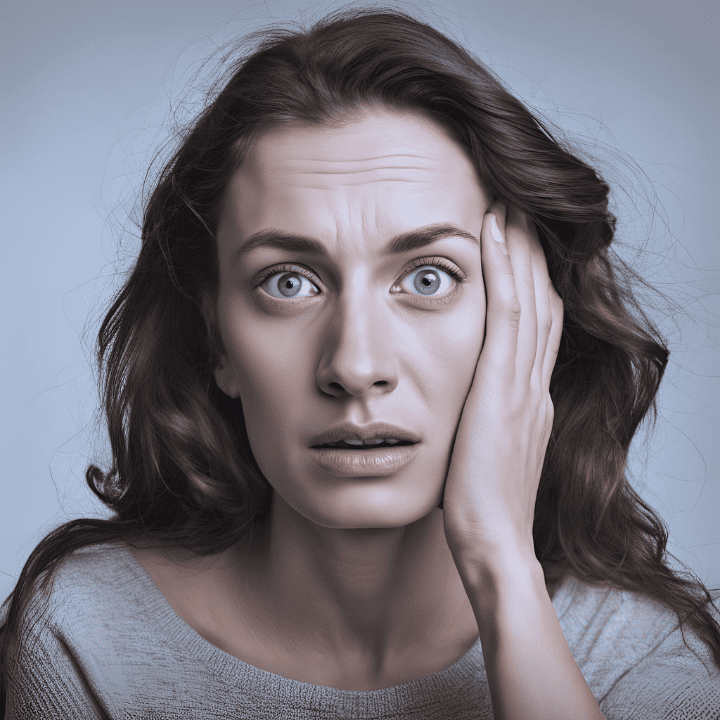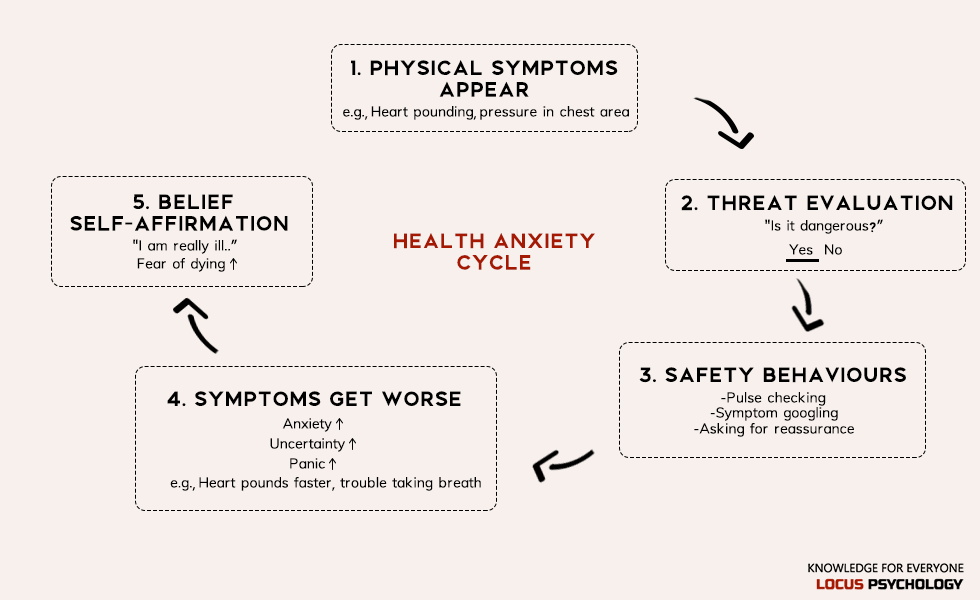
Health anxiety can be the result of previous experiences dealing with life threatening diseases, e.g. cancer or stroke, after which an individual develops fear of illness returning later.
Person can also develop health anxiety after experiencing persistent physical symptoms, like heart pounding, fainting, difficulty breathing which aren’t related to somatic illness. Generally they are related anxiety and are signs of sympathetic nervous system (SNS) hyperactivity.
Symptoms of health anxiety (related to sympathetic nervous system hyperactivity)
- Heart pounding
- Feeling light headed, experiencing feeling of fainting
- Hot flashes
- Difficulty breathing, pressure in chest area
- Choking, lump in throat
- Tiredness, heavy feeling in body, muscles
- Numbness, tingling in body
- Impaired vision, feeling like in a glass box
- Dry mouth
- Sweaty hands and feet
- Need to use restroom more often
- Regular cough
- Skin or digestive issues
Health anxiety symptoms gets worse when you are stressed
Generally health anxiety symptoms get worse when you experience additional stress in life.
Health anxiety can be triggered by:
- Fear of rejection or judgment;
- Loss or separation from loved one;
- Arguments with close relatives or boss;
- Failure in school or job;
- Uncertainty, helplessness in particular life situations, etc.
Stressful events trigger a body’s stress response and activate the sympathetic nervous system. Prolonged periods of stress hyperactive sympathetic nervous systems and lead you to experience unpleasant physical symptoms. For example, heart pounding, difficulty breathing, feeling light headed, etc. Symptoms can be interpreted as a sign of actual illness like heart failure or stroke and make you feel overly concerned about your health.
Overall health anxiety symptoms can be scary but they aren’t dangerous to your health. More you perceive them as dangerous the more you will feel like being in danger. Nevertheless, if you suffer from health anxiety, you should never delay a doctor’s visit if you feel like your health is in danger. It’s your right to make sure you’re healthy!
How does health anxiety start?
Health anxiety can be a sign that you are dealing with psychological distress. Sometimes you can be aware of it but for most people who suffer from health anxiety psychological distress can be disguised deep in the subconscious mind. You may not even realize that physical symptoms you experience are signs of building psychological pressure that hasn’t been resolved.
Over time psychological pressure builds up and if it’s not taken care of, it transforms itself as a form of anxiety, physical illness in the body. At times you may feel a racing heartbeat, have feelings of choking or fainting. Experience difficulty breathing. Have cold, sweaty hands and feet. Feel weakness in muscles or numbness, tingling in the body. Have problems with vision or digestion, etc
Going to emergency room
Physical symptoms of health anxiety can be very disturbing. You might feel that there is a real health emergency and you are having a heart attack or stroke. You may call an ambulance and go to the emergency room to perform a health examination like heart electrocardiogram, blood tests, X-ray and magnetic resonance.
In most cases of health anxiety, tests come back negative. No changes can be detected at somatic level and you are declared as physically healthy. Usually doctors don’t give comprehensive feedback after examinations have been done. Sometimes they do a poor job of explaining to the patient what anxiety is.
Patients from hospital come back rather confused then understanding of issue. Doctors usually give out generic advice ,,Oh, it’s just your nerves, you need to worry less and relax more.’’ ,,Take some multivitamins and drink herbal teas that will help you to relax.” While some people can find this advice helpful, people who experience physical symptoms recurring symptoms get deeper in the rabbit hole.
Health anxiety cycle
The real problem starts when physical symptoms of health anxiety start to appear more often and for no apparent reason. Such experiences can raise your concerns over health and this is where the health anxiety cycle begins.
You can start to pay too much attention to every symptom in your body trying to find signs of illness. Such behavior can trigger stress response and it can change your perception of normal body functioning. Under stress any physical sensation can be perceived as potential threat, danger to the health.
You may start to occasionally check your heart rate or poke lymph nodes to find tumors. Feeling of danger can become so real, that you might find or feel something that is not there. In order to reduce anxiety, you may start to google your symptoms. Ask family members for their opinion in order to reassure yourself that you are okay.
Safety behaviors keep you in health anxiety cycle
Behaviors mentioned above are called safety behaviors. They relieve anxiety in the short-term but keep you stuck to the problem overthinking, worrying , researching, asking. You can go through the whole internet to find evidence that you are ill. You can always find one if you’re looking for one.
Safety behaviors keep health anxiety sufferers always second guessing and never sure of themselves. Uncertainty raises anxiety and activates the sympathetic nervous system which in turn worsen symptoms of health anxiety.
For example, you might find an article on Google about a young person dying from a heart attack. It was reported that he had such and such symptoms before. There is a high chance that this article will have a negative effect on you if you are dealing with cardiophobia. You may worry that your symptoms are similar to ones you found on Google. You may fear that you will also die young.
Worrying only worsens your physical symptoms. Your heart might start to beat faster, your thoughts might become uncontrollable. Increasing physical symptoms can act as confirmation to yourself that something will happen and you might start to believe that you are in actual danger.
Health Anxiety Cycle

Recovery from health anxiety
First stage:
Treatment is based on Acceptance and Commitment Therapy (ATC) and Cognitive Behavioral Therapy (CBT) techniques. Designed for those who are new to Health Anxiety or experience low, moderate symptoms.
Treatment includes various skills and techniques that client has to master:
- Understanding physiology of anxiety and Health Anxiety cycle.
- Ability to manage uncertainty and accept, sit through physical symptoms.
- Management of safety behaviors (stopping or delaying behaviors like checking body, Googling symptoms, asking for reassurance, avoiding activities).
- Management of cognitive distortions (such as Catastrophizing, Predictive Thinking).
- Relaxation and breathing techniques.
- Shifting attention and getting back to doing hobbies, activities which were practiced prior to health anxiety.
- Sticking to a recovery plan even if things are going steady.
Second stage:
Treatment is based of a Depth Psychology princaples, Psychodynamic Therapy (PDT) and Cognitive Behavioral Therapy (CBT) techniques. Designed for those who want understand and overcome their personality stuctures and dynamics that produce anxiety, suffering.
Treatment includes various skills and techniques that client has to master:
- Learn to become aware, consciouss of behaviours, beliefs that produce anxiety.
- Manage high expectations and standarts within yourself.
- Freely communicate anger, being upset to others without feeling guilty or fearful.
- Understand your needs and resources when making decisions.
- Saying ,,No” to others when you feel like something is for you.
- Manage behaviors, e.g. taking care of other people needs and problems, etc.
- Act like authenthic self without feeling fear of judgment or rejection.
- Set healthy boundaries in relationships.
